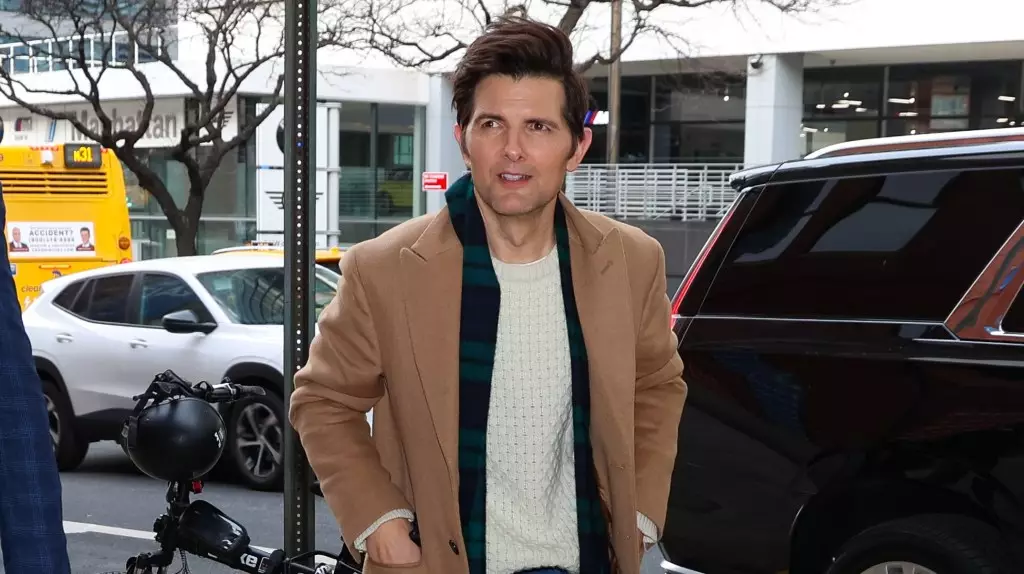In an age where marketing strategies have become as layered as the content they aim to promote, Lumon Industries’ pop-up at New York City’s Grand Central Terminal embodied a cunning return to the unique narrative of Apple TV+’s hit series, “Severance.” On January 15, the cast, led by the charismatic Adam Scott, brought their fictional workplace into the bustling heart of the city, creating an atmosphere ripe for conversation and reflection. This clever publicity effort was not merely an advertising tool; it was a thought-provoking meta experience that mirrored themes within the series. While the concept seemed cheeky and entertaining on the surface, it inadvertently called attention to ethical quandaries surrounding corporate culture, surveillance, and the often disconcerting divide between work and personal life.
Adam Scott, known for his role as Mark S., described the pop-up experience as “super fun,” contrasting his character’s oppressive workplace existence. In a revealing moment during an interview with Stephen Colbert, Scott humorously recounted how he and his co-stars Patricia Arquette, Britt Lower, Zach Cherry, and Tramell Tillman managed to inhabit the discomforting atmosphere of their characters while engaging in what remarkably resembled their show’s “macro data refinement.” The irony of engaging in monotonous office work while drawing crowds validated the show’s biting commentary on modern labor. It’s not just about the tasks performed, but the ritual of normalizing a dehumanizing corporate structure that many viewers are tragically familiar with.
Scott’s jest about not leaving the glass cube for three hours illustrates an intriguing concept: performance versus reality. While they acted out the life of Lumon employees, audiences observed a scripted recreation where characters were confined in a space reflecting a broader critique of the mundane grind that defines many workplaces today.
The anticipation for “Severance” Season 2 serves as a testament to the show’s ability to resonate deeply with viewers. This allure lies not only in the show’s premise—that of workers choosing to sever their memories to create a stark demarcation between their work and personal lives—but also in its broader implications about the nature of identity in the contemporary work environment.
As Scott shared snippets about the upcoming season, particularly his riveting portrayal of Mark sprinting through the sterile white hallways of Lumon, he drew parallels to cinematic icons, notably Tom Cruise. His homage to Cruise’s running style underscored the lengths to which he and his colleagues were willing to go to embody their roles authentically. The immense effort that went into these sequences, spanning five months, reflects a dedication that transcends typical television production, further enhancing the show’s artistic merit.
The Weight of Expectations
Notably, during the lengthy hiatus between seasons, Scott mentioned the pressure surrounding the series. The intense anticipation from fans, including his disinterested teenage children, highlighted a cultural phenomenon where media consumption habits have shifted, allowing certain shows to grow a dedicated following that crosses generational lines. This speaks volumes about “Severance” not just as a drama but as a cultural touchstone that critiques labor dynamics amid evolving viewer expectations.
As gripping as it is entertaining, “Severance” manages to engage with complex themes surrounding personal sacrifice for the sake of career advancement. It asks tough questions about how much of ourselves we are prepared to sever for the sake of corporate identity—a notion that resonates with a work-centric culture still grappling with the implications of remote work, burnout, and the mental health crisis rooted in occupational stress.
As the buzz surrounding the second season continues to build, it’s clear that “Severance” is more than just a narrative about employees at a fictional corporation. It is a reflective piece on life’s choices, modern labor, and the intricate dance between our professional personas and personal identities. Through clever marketing strategies and compelling storytelling, it invites viewers to confront their relationship with work in a world where the boundaries have become increasingly blurred. As we dive into the new season, it remains to be seen how the story will evolve, but one thing is for certain: it will continue to spark conversation about the ever-relevant questions of autonomy and self in the age of corporate omnipresence.
